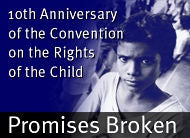|
|
Street children throughout the world are subjected to physical abuse by police or have been murdered outright, as governments treat them as a blight to be eradicated-rather than as children to be nurtured and protected. They are frequently detained arbitrarily by police simply because they are homeless, or criminally charged with vague offenses such as loitering, vagrancy, or petty theft. They are tortured or beaten by police and often held for long periods in poor conditions. Girls are sometimes sexually abused, coerced into sexual acts, or raped by police. Street children also make up a large proportion of the children who enter criminal justice systems and are committed finally to correctional institutions (prisons) that are euphemistically called schools, often without due process. Few advocates speak up for these children, and few street children have family members or concerned individuals willing and able to intervene on their behalf. The term street children refers to children for whom the street more than their family has become their real home. It includes children who might not necessarily be homeless or without families, but who live in situations where there is no protection, supervision, or direction from responsible adults. While street children receive national and international public attention, that attention has been focused largely on the social, economic and health problems of the children -- poverty, lack of education, AIDS, prostitution, and substance abuse. With the exception of the massive killings of street children in Brazil and Colombia, often by police, which Human Rights Watch reported in 1994, very little attention has been paid to the constant police violence and abuse from which many children suffer. This often neglected side of street children's lives has been a focus of Human Rights Watch's research and action. The public view of street children in many countries is overwhelmingly negative. The public has often supported efforts to get these children off the street, even though they may result in police round ups, or even murder. There is an alarming tendency by some law enforcement personnel and civilians, business proprietors and their private security firms, to view street children as almost sub-human. In several countries where we have worked, notably Brazil, Bulgaria, and Sudan, the racial, ethnic, or religious identification of street children plays a significant role in their treatment. The disturbing notion of "social-cleansing" is applied to street children even when they are not distinguished as members of a particular racial, ethnic, or religious group. Branded as "anti-social," or demonstrating "anti-social behavior," street children are viewed with suspicion and fear by many who would simply like to see street children disappear. In Bulgaria, Guatemala, India, and Kenya, Human Rights Watch has reported that police violence against street children is pervasive, and impunity is the norm. The failure of law enforcement bodies to promptly and effectively investigate and prosecute cases of abuse against street children allows the violence to continue. Establishing police accountability is further hampered by the fact that street children often have no recourse but to complain directly to police about police abuses. The threat of police reprisals against them serves as a serious deterrent to any child coming forward to testify or make a complaint against an officer. In Kenya, Human Rights Watch has worked with NGOs and street workers to encourage the establishment of a network for documenting and reporting police abuses against street children, and to improve children's treatment by police. Yet even in Guatemala, where the organization Casa Alianza has been particularly active in this regard and has filed approximately 300 criminal complaints on behalf of street children, only a handful have resulted in prosecutions. Clearly, even where there are advocates willing and able to assist street children in seeking justice, police accountability and an end to the abuses will not be achieved without the commitment of governments.
Related Human Rights Watch Documents
Charged with Being Children: Egyptian Police Abuse of Children in Need of Protection
Report, February 2003
Promises Broken: Police Abuse and Arbitrary Detention of Street Children
World Report 2000 Section on Children's Rights: Police Abuse and Arbitrary Detention of Street Children HRW Publications
Easy Targets: Violence
Against Children Worldwide
